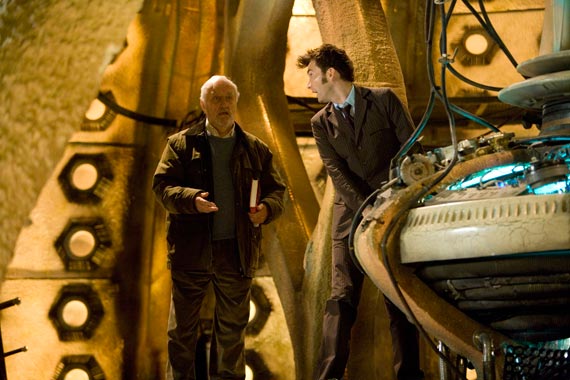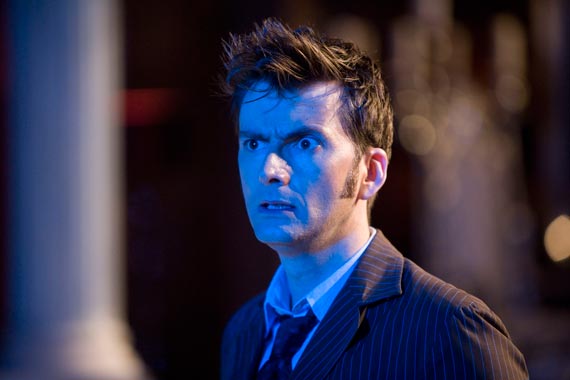Unpopular Opinion: The End of Time

Guest contributor Michael Coats gives his take on the Tenth Doctor’s final story.
Okay, this one could get me into a lot of trouble with certain areas of the fandom. But, I am going to write this anyway, even if it is the equivalent of running across a Cyberman’s field of vision and yelling ‘Look at me, I’m a target!’ Now, I should make clear that I don’t hate The End of Time, although I find it below average. Some ideas were good and done well, others were not so good and/or not done well. In between starting and finishing this article, I’ve read The Writer’s Tale: The Final Chapter, which has actually made this harder to write; because it’s clear now exactly how much effect outside influences had on the story (thank you, Benjamin Cook, you’ve a lot to answer for); although RTD is still principally at fault.
So then, what does work about the story? Well, the majority of Part One is actually pretty good, barring a few exceptions, Outside of that, the opening 20 minutes of Part 1 are particularly good, cheesy and yet horrifying in the best of ways (‘DINNER TIIIIIIIME!’) I do have one or two minor complaints regarding a couple of things, such as the ‘Potions of Life’. Where did they come from then? Oh. In addition, I don’t exactly find the idea that the Ood are ‘accelerated’ while nothing else is to have much sense. The second half of the restaurant scene with Wilf and after all the talk about death (which I hated, but we’ll get to that) when Donna shows up is also quite wonderful. I would also like to say of the narration that it’s a particularly nice bonus on repeat viewing that Rassilon’s ‘The Madman and His Saviour’ speech about The Doctor and The Master is interchangeable, in that both roles and descriptions fit each character if you know what’s coming.

In Part Two it gets a lot harder to find anything that I actively do like, simply because there is a whole lot of things I don’t like, really don’t like or actively hate. If Part Two was a standalone episode, I’d probably rank it alongside Love and Monsters, Fear Her and the likes. That being said, there are bits which I do like: most scenes with the Doctor and Wilf (apart from the radiation chamber one, have a guess why), the fact that Donna’s lottery ticket came courtesy of £1 from her late father Geoffrey Noble, Rassilon’s attitude to The Master and his subsequent comeuppance for it, and of course, Eleven’s arrival. However, my favourite scene of the two parts is surprising, in that it’s a cameo that Russell worries in The Writer’s Tale that may be an indulgence too far, and it’s part of the episode I like a lot less than the one that immediately preceded it. I’m referring to the scene between The Doctor and Verity Newman (in itself a beautiful homage to the show’s creators), the identical great-granddaughter of Human Nature/The Family of Blood character Joan Redfern. It’s genuinely the only part of the story that makes me cry for the Doctor (well, his recounting of the events of The Waters of Mars and traveling alone to Wilf does make me a little choked up). Unlike the ‘I don’t want to go’ scene coming up, it sees beautifully understated performances from David Tennant and Jessica Hynes, who act their backsides off. The almost-smile the Doctor gives when asked whether he was happy in the end is heartbreaking.
Across both parts, the use of Wilf and The Woman (whom, let’s not beat about the bush, is obviously the Doctor’s mother) is particularly inspired. There is nothing negative I can say about them or the roles which they took in the story, and I was particularly pleased with Wilf being the payoff to the ‘four knocks’ arc that pervaded the Specials. Any scene involving ex-companion Donna Noble or her mother Sylvia is also bound to give you a smile.

Now, we get on to what doesn’t work. The main problem with the story is the amount of retcons necessary for the story to actually work, including some of Russell’s own work. Starting off with Logopolis which is actually retconned TWICE; apparently the Doctor can fall several hundred metres from the Hesperus through a glass dome and survive with just some (not very deep) cuts and bruising to his skin, despite the facts that a simple fall from a radio tower was enough to cause Four to regenerate; and the glass alone should be enough to kill him, especially since he fell onto it. Perhaps that would have taught him about ‘not wanting to go’. There’s artistic licence and there’s plain ridiculousness. I can’t bring myself to believe that. Another issue requiring a retcon is the Time Lords’ return; their villainhood and the end of the Time War. This retcon is targeted at The Parting of the Ways. In it, The Doctor states that ‘(the Time Lords) were destroyed, but they took the Daleks with them. Now I find out that they died for nothing’ or words to that effect. Uh. Anyone else see a problem here? Because I see a rather large one. However, this is not completely RTD’s fault as I used to think it was. While he did make the decision, the idea came from Julie Gardner and received a large amount of egging on from Benjamin Cook and a small amount from Moffat himself! (Please don’t encourage people to overwrite their own continuity for the sake of fanboyism again Moff, although I doubt you and Russell went back and noticed that line. You should have.)
Now, the real problems which are down to RTD alone: the concept that regeneration feels like dying is totally absurd. It’s physically painful and would be better off avoided, sure, we’ve seen that and it’s understandable you’d want to avoid it, for the same reasons you’d want to avoid being shot even if you were guaranteed to survive it (Oh, hey there Jack. No, I don’t want to have a drink with you.). The line ‘a new man goes sauntering away, and I’m dead’ retcons every regeneration story; and not just those of the Doctor. Or rather, it tries to. In the overwhelming cavalcade of evidence against it, it just plain doesn’t stand up. It annoys me when people think that it does, because it’s pretty clear they haven’t watched or don’t care about the Classic series (and probably both). A clear sign of a Tennant fangirl, usually. But I digress.
Apart from regeneration stories, it also contradicts Born Again/The Christmas Invasion, Ten’s first story, where he categorically states that he’s the same man twice. It basically flies in the approach of everyone else who has come before, showing a profound disrespect for former showrunners and writers. The personalities of all former Doctors are still present, they’re just not dominant and not in control, which is in evidence in several stories. This is the approach Moffat has taken, quietly ignoring the contradiction, because it’s the only sensible approach. But this is just one problem; following the Doctor’s logic, presuming that Romana regenerated on a whim in Destiny of the Daleks (which given there is no unquestionably canon explanation for it, she did), she basically committed suicide with no reaction whatsoever. What. Even if you say she didn’t, there are documeted cases of forced regenerations, so my point is not any less true.

This also brings up the issue of Ten’s characterisation in this episode. It’s odd that given The Waters of Mars is supposed to be his biggest fall, he actually comes across much more likeable in that story than he does in this one. Given we know that the idea of regeneration being equivalent to death is nonsense, Ten is constantly unnecessarily whiny. This is justifiable while he believes he’s actually going to die, as in kaput; but he doesn’t. Especially given he knows he’s going to survive, his attitude towards Wilf in the radiation chamber seen is appalling. He has enough justification for maybe a little bit of anger towards him because he has to suffer excruciating pain twice should he rescue him, but he’s way out of line. If Wilf got to see him happy as Eleven (pre-TATM of course), I’m sure his sympathies would be pretty limited.
The final problem with the episode is also connected with the Doctor’s attitude. The farewell scenes were too much of an indulgence. Mickey and Martha could have returned in future installments (and may yet do) so I don’t think they really needed that scene. Sarah Jane’s scene definitely wasn’t needed, as well-loved as she was. It made no sense, given her Doctor was really Three and then Four and everything. Something which could have had a point if it actually led somewhere was the scene with Captain Jack and Alonso. It wouldn’t if Alonso had actually played a role (or was even mentioned) in Torchwood: Miracle Day (and a new Torchwood team involving him and Lois Habiba would have been awesome by the way), but it just seems as though it’s there purely because RTD fancies Russell Tovey (though thank goodness we didn’t get RTD’s suggestion of The Doctor walking in on Elton and Ursula of Love and Monsters’ love life, thanks for burning that mental image into my skull forever, Russell). The only scenes that made any sense were the ones with Verity Newman, Donna and Rose, because there was unfinished business there (and the latter makes a nice bookend with Rose being the first and last person Ten saw).

Finally, given he’s you know, not actually dying, saying ‘I don’t want to go’ (which was overacted in the first place, not that it was Tennant’s fault, given four scenes of varying emotion were filmed) when he got to tie up the loose ends from incarnations One through Ten sounds pretty ungrateful to me, seeing as none of the other Doctors got the chance to do that and yet they didn’t complain about ‘dying’. Maybe Russell should have gone with the suggestion that Ten should have been hit by a bus and have an eyeball hanging loose. If he said he didn’t want to go then, he’d have looked and sounded completely ridiculous, which is exactly what he was being. This story isn’t the only reason Ten was my least favourite Doctor, but it was a considerable percentage thereof.
I think the fangirls will be after my blood for that one. Let them come. Sun filter, rising…








